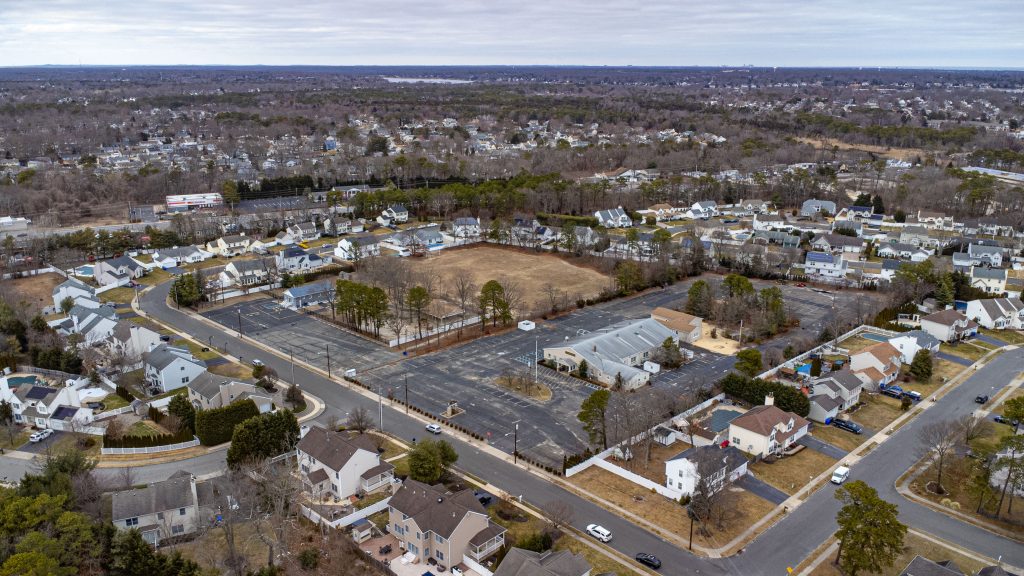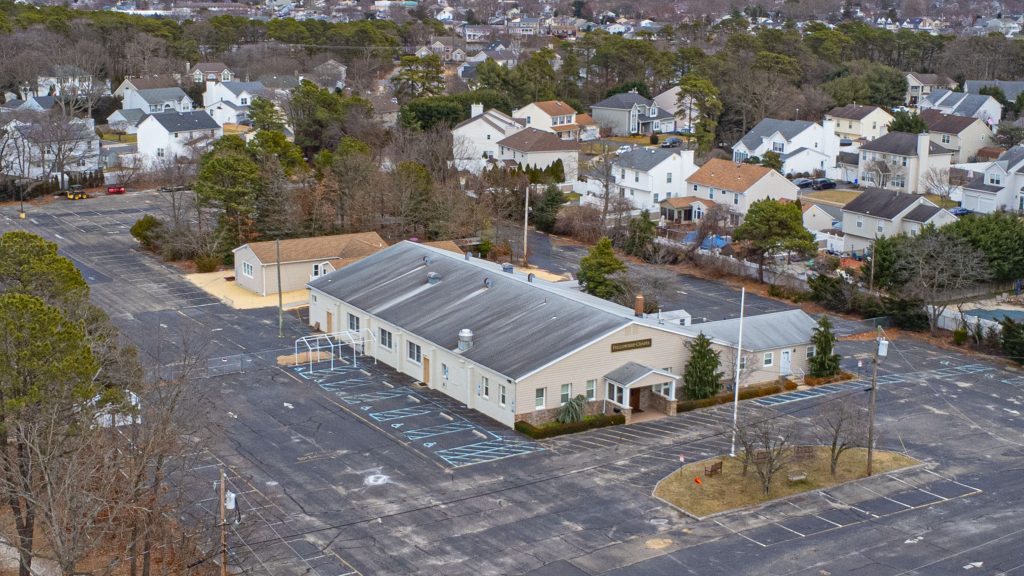
Fellowship Chapel, the site of a proposed school, at 170 Duchess Lane, Brick, N.J. (Photo: Shorebeat)
A packed hearing Monday night on an application by a home-school group to operate collectively within the property owned by a Brick Township church included testimony – and challenges – from representatives of the home-school group with a number of objections raised by an attorney hired by neighbors who are opposed the idea.
Fellowship Chapel of the Jersey Shore, located virtually completely within the confines of an existing residential neighborhood on Duchess Lane, wishes to lease its facilities out to a group known as the Liberty School Association, which describes itself as a group of parents who do not wish to send their children to public schools, but seek to “home school” their children together in a communal setting within the church.
Led by Rebeka Snegon, organizer of the Liberty School Association, the group already had been stopped from using a building on Princeton Avenue as a school – as well as the church property itself – after they failed to obtain zoning permits to operate schools in the respective zones in which the properties were located.
|
|
A hearing on the proposal in May was adjourned after it became clear that interest in the application would exceed the capacity of the normal meeting room at town hall. Monday’s meeting was held in an all-purpose room at Civic Plaza on Chambers Bridge Road, the largest venue for seating owned by the township. A large crowd gathered to hear the proceedings, which included testimony from Matt Cronin, an architect in Red Bank, as well as Cliff Whitehead, the pastor of Fellowship Church, which as owner of the property is listed as the applicant.
Residents have rallied against the proposal, given its location encircled by single-family homes, concerns over traffic moving in and out of the facility on a daily basis, and the fact that once a variance is granted, permission to use the property as a school would continue in perpetuity. Neighbors have also expressed concerns that nothing precludes a future tenant or owner of the property from applying to expand the school use. They hired noted attorney Edward Liston, notorious for his animated and intensive cross-examinations at such hearings, to represent them in a formal objection.
“Some parents … don’t necessarily want to send their children to a Christian school, and this would be a school independent of us, but we have a good working relationship with them,” said Whitehead, under direct examination by his own attorney, Richard C. Sciria.
Whitehead testified that the school would not place an undue burden on neighboring residents.
“We have a Sunday service and Sunday school on Sunday morning,” he explained. “We have a mid-week service on Wednesday evening. But the school would operate Monday through Thursday from 9 [a.m.] to 2 [p.m.]. There will always be someone – one of us from the church itself – there, but they would operate independently.”
Whitehead said he would still conduct day-to-day operations such as counseling in his office at the facility, but religious services are limited to a Sunday service, Wednesday Bible study and a men’s worship group that also meets in the evening during the week.
“The church will not be operating with its congregations at the same time to school is opening,” he testified.
The school would operate with between 30 to 40 students, its applicant has said. At Monday night’s hearing, representatives for the school testified that the school itself would not provide busing or transportation, however it was not clear whether parents themselves could collectively hire a transportation company or not.
Previously, Sciria told board members that transportation vehicles “smaller than daycare buses” would serve the school, though this was shared at the initial, approximately five minute-long meeting that was quickly adjourned without any further details being shared.

Fellowship Chapel, the site of a proposed school, at 170 Duchess Lane, Brick, N.J. (Photo: Shorebeat)
Testimony became heated as Liston challenged whether the church had filed a proper site plan before the board, arguing the applicant failed to do so and instead only submitted a “variance plan” to support their application.
Liston also said a previous variance granted to the church in 2012 had not been reviewed by the architect, who was subject to a cross-examination. At one point, Liston question whether buildings on the site had been modified without permits dating back several years. The architect, for his part, testified that he relied on church officials to inform him of the past history of the site.
Tara Paxton, the township planner, said the property itself may not be ready to be used as a school use, requiring access that does not appear to currently be available to some facilities.
“The access to the back of that property would need to be accessible to emergency vehicles,” Paxton said, also commenting on zoning codes that would cover the playground area of the site.
“I would recommend that you look at the accessible pathway, because you have to have ADA access for the occasion where a student is physically disabled and would need to reach the playground by alternate means rather than walking on the grass,” she said. “There needs to be a locked gate somewhere that our emergency professionals can access.”
Liston later raised a question as to whether a mortgage on the property had been settled, as such an institution may have an interest in the status of the property. The pastor testified that a mortgage existed, however Liston presented evidence that a mortgage had been satisfied on the property.
“All I know is that we’re sending out a mortgage [payment] every month,” Whitehead replied, saying he would have to check with his church’s treasurer, raising questions as to where mortgage payments were being sent each month if the only mortgage on the property had ostensibly been paid off.
According to county land records, the building is located in the R-10 zone, which calls for single-family residential uses on properties of at least 10,000 square feet in area. The Fellowship Chapel building spans 4 acres and was last sold in 2012 for $1.25 million. It is listed as a “church/parsonage” as its current allowed use.
Liston also asked the pastor what he knew about his tenant, the Liberty School Association. He replied that it was a national organization.
“I know that Rand Paul was involved with them,” Whitehead said, referencing the libertarian-minded U.S. Senator from Kentucky. “I don’t know all of the details, but this particular school … is not answerable to the national association.”
Liston questioned whether the school was associated with a separate group known as “Moms for Liberty,” which was the subject of an article in the Asbury Park Press on Monday, which reported the group was classified by the controversial Southern Poverty Law Center as an anti-government group. Whitehead said he did not know if the Liberty School Association, Snegon or other parties associated with the school had ties to the group.
Snegon and another individual, Robert Colontino, are already suing the township after being ejected from the premises at 11 Princeton Avenue for running an unpermitted school in that location. Colontino, in their court papers described themselves as “sovereign living souls” and “Judicial Power Citizens by right of blood” who filed the court papers under a “non-domestic mail” address that traces back to an Italian takeout restaurant in Ortley Beach. The language in the lawsuit resembles that of court documents filed in the past by those who affiliate with the so-called “Sovereign Citizen” movement, though there was no direct reference to the controversial political ideology in any of the school’s documents.
Snegon did not testify Monday; the meeting reached its three-hour limit before she or other witnesses could be called.
The board, professionals from all concerned parties and attorneys and witnesses, agreed to adjourn the hearing and continue it Aug. 12, 2024. That hearing will, likewise, be held at Civic Plaza, 270 Chambers Bridge Road.












